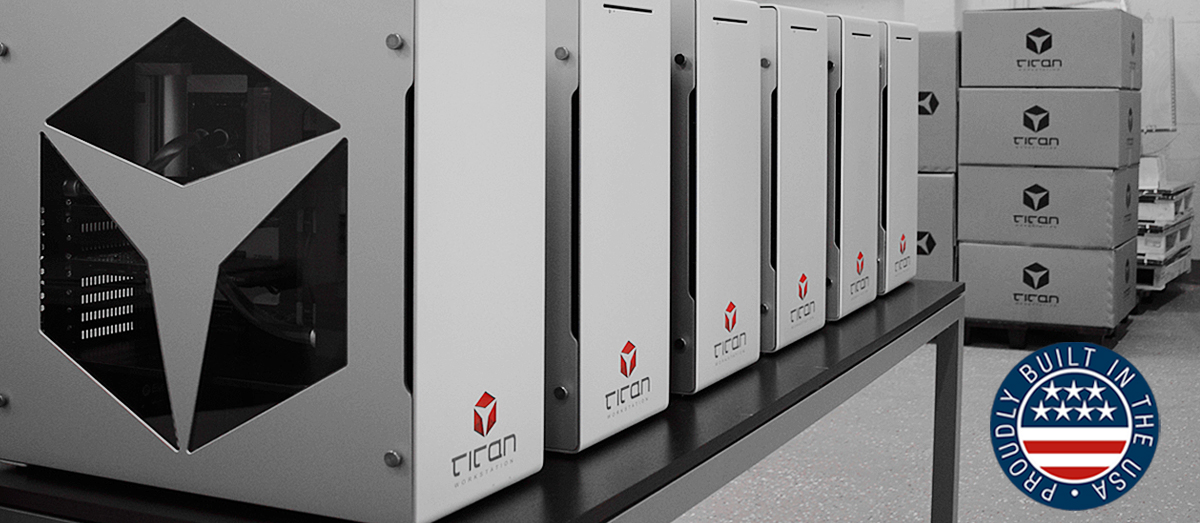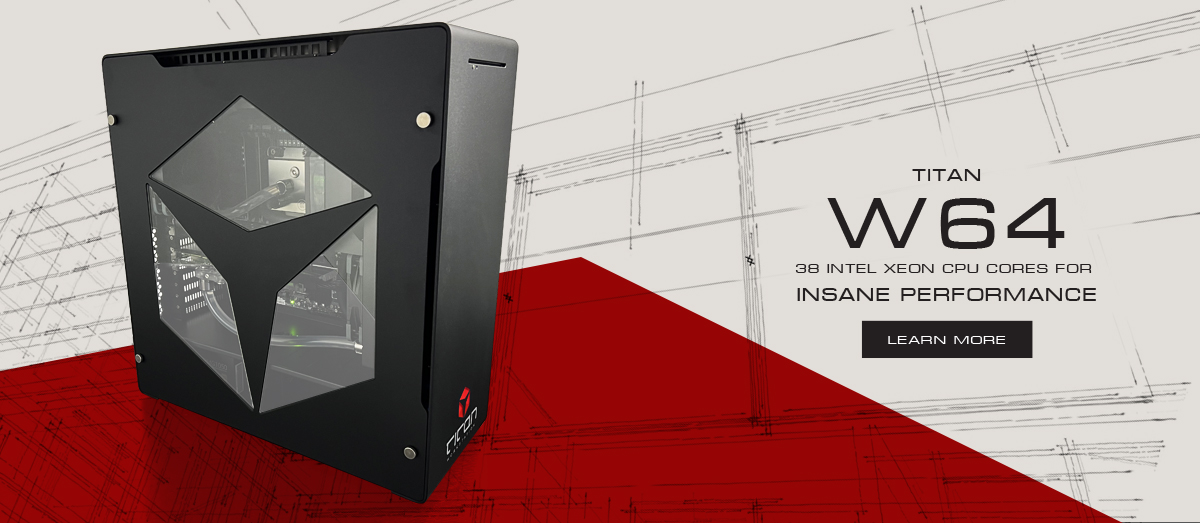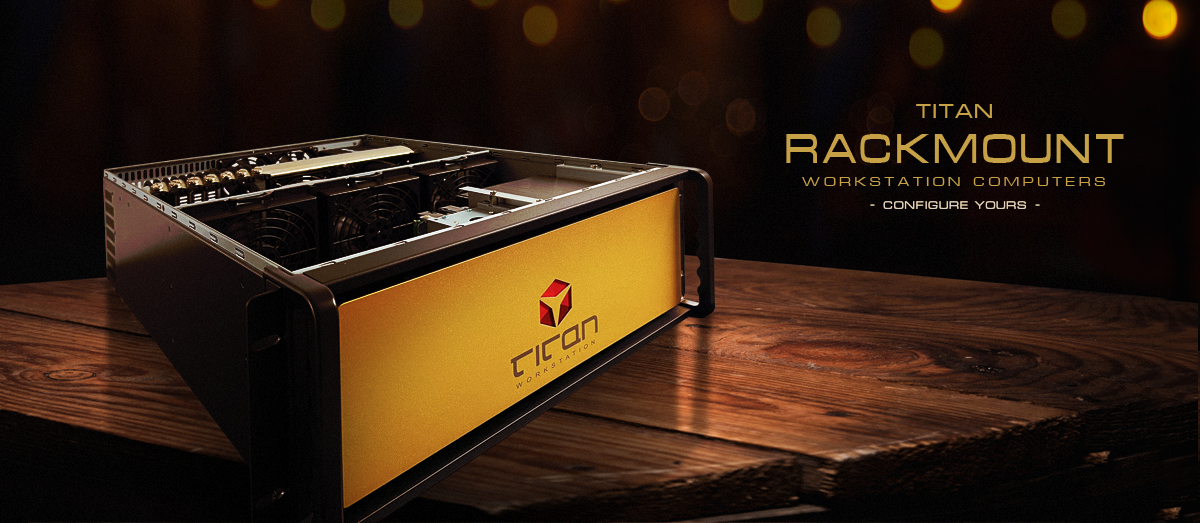Back to all articles
What To Consider When Buying a Workstation
Published: 02-23-2023
So you’ve got a budget, and you have a job that only a computer can do, but which workstation should you buy? It can be a complicated decision and no one wants to spend money on a computer that doesn’t meet their current and future needs.
If you’re not sure which Titan workstation is right for you, let’s walk you through the most important considerations when tricking out your build.
Processing power
Professional users often require a high-performance computer with a powerful processor to handle demanding tasks such as 3D rendering, video editing, and complex data analysis. If you need a workstation to handle these types of tasks, you’ll need to ensure you buy the right type of CPU:
- Video editing and 3D animation software: These programs typically require a lot of processing power to handle large files and complex effects.
- CAD and 3D modeling software: These programs often require high-performance CPUs to handle large and complex designs.
- Data analysis and visualization software: These programs often involve complex calculations and algorithms, which require a powerful CPU to run efficiently.
- Financial modeling and simulation software: These programs often require a lot of processing power to handle complex calculations and simulations.
- Professional audio and music production software: These programs often involve complex algorithms and effects requiring a powerful CPU to run smoothly.
It gets a little more complicated than that, some types of professional software benefit more from having more CPU cores, while others require fewer threads but benefit from fast single-core performance.

Professional software that benefits from having many CPU cores may include
- Video editing and 3D animation software: These programs can often take advantage of multiple cores to process multiple tasks simultaneously, which can improve performance and speed up the editing process.
- CAD and 3D modeling software: These programs can often use multiple cores to handle complex designs and simulations, which can improve performance and speed up the design process, although their need for multiple cores is moderate and single-core performance is still very important.
- Data analysis and visualization software: These programs often involve complex calculations and algorithms, which can benefit from having multiple cores to run multiple tasks simultaneously. In general, more cores are preferable to a focus on single-core performance.
- Financial modeling and simulation software: These programs often require a lot of processing power to handle complex calculations and simulations, which can benefit from having multiple cores to run multiple tasks simultaneously. This is another thread-hungry workload.
On the other hand, professional software that benefits more from fast single-core performance may include:
- Professional audio and music production software: These programs often rely on fast, real-time processing of complex audio algorithms, which can be optimized by having a fast single-core processor.
- Single-threaded applications: Some professional applications, such as certain types of software development tools, are designed to run efficiently on a single-core processor, so a fast single-core processor can improve performance.
- Real-time applications: Applications that require fast, real-time processing, such as certain types of gaming and simulation software, can benefit from having a fast single-core processor to handle the demands of the application.
Since there is such a variety of software options, even within the same class of software, it’s always a good idea to do some research on how many cores the specific software you want to run can use.
Graphics
For applications that require intensive graphics processing, such as 3D modeling or Machine Learning, a workstation should have a dedicated graphics card with a high amount of video memory.

Memory and Storage
A workstation should have enough memory and storage to support the user's workload, including large files and programs.
The amount of RAM that is right for different common types of professional software may vary depending on the specific requirements of the software and the workload of the user. However, as a general guideline, the following amount of RAM may be appropriate for different types of professional software:
- Video editing and 3D animation software: These programs typically require a lot of memory to handle large files and complex effects, so 32-64GB of RAM is recommended for professional editors.
- CAD and 3D modeling software: 16-32GB of RAM is recommended.
- Data analysis and visualization software: These programs often involve complex calculations and algorithms, 32-64GB of RAM is recommended.
- Financial modeling and simulation software: These programs often require a lot of memory to handle complex calculations and simulations, so 32-64GB of RAM is often recommended.
- Professional audio and music production software: 16-32GB of RAM is recommended.
When choosing between SSD and HDD storage for professional workstation users, some key considerations may include:
- Performance:
SSDs are generally faster and more responsive than HDDs, which can be
beneficial for applications that require fast data access, such as video
editing and 3D modeling. In general, ALL operating systems and
applications benefit from SSDs and so we consider it a minimum
requirement as the primary system drive.
-
Capacity: HDDs are typically available in larger capacities than SSDs,
which can be useful for users who require a lot of storage for large
files, such as video and audio files. We strongly recommend a large HDD
as a secondary drive for cold storage.
- Cost: HDDs are generally less expensive than SSDs, which can be a factor for users working with a limited budget.
-
Reliability: SSDs are generally more reliable than HDDs, as they are
less susceptible to physical damage and data loss due to factors such as
shock and vibration.
-
Energy efficiency: SSDs are typically more energy-efficient than HDDs,
which can help reduce power consumption and save on energy costs.
Overall,
professional workstation users may want to consider a combination of
both SSD and HDD storage, with the SSD providing fast performance for
critical applications and the HDD providing additional capacity for
large files and data sets.
Most
Titan workstations have a fast NVME SSD as its primary drive for the
operating system and applications, with a large mechanical hard drive
for mass storage, but you can configure virtually any combination of
drives, including special RAID setups for speed, reliability, or both.

Expandability
A workstation should have multiple expansion slots and ports to support additional hardware, such as additional graphics cards, storage devices, and peripherals.
When choosing a workstation computer, important types of expandability to consider may include:
- Additional graphics cards: For professional users who require intensive graphics processing, the ability to add additional graphics cards can improve performance in certain applications that can make use of multiple cards.
- Additional storage devices: For users who require a lot of storage for large files, the ability to add additional storage devices such as hard drives and SSDs can increase capacity and improve performance.
- Additional memory: For users who require a lot of memory for demanding tasks, the ability to add additional memory can improve performance and enable the use of more complex programs and data sets.
- Additional peripherals: For users who require a wide range of input and output devices, the ability to add additional peripherals such as additional displays, printers, and scanners can enhance functionality and enable the use of more complex workflow processes.
Expandability is important when choosing a workstation computer because it allows users to add additional hardware as their needs evolve, enabling them to continue using the same computer for a longer period of time and reducing the need to upgrade to a new machine.
Reliability and durability
Professional users often rely on their workstations for critical tasks, so it's important to choose a computer with a proven track record of reliability and durability.
When choosing a power supply unit for a professional computer workstation, the most important considerations may include:
- Power output: The power supply unit should be capable of providing sufficient power to support the system and any additional hardware, such as additional graphics cards or storage devices. There should also be enough power overhead to account for the supply aging.
- Efficiency: An efficient power supply unit can help reduce power consumption and save on energy costs, so it's important to choose a unit with a high efficiency rating.
- Reliability: Professional users often rely on their workstations for critical tasks, so choosing a power supply unit with a proven track record of reliability is important to avoid downtime.
- Compatibility: The power supply unit should be compatible with the system and any additional hardware, including the motherboard and graphics card.
- Warranty and support: A power supply unit should come with a comprehensive warranty and support package to ensure that any issues can be quickly resolved
For mission-critical workstations, you may want to consider a redundant power supply. A redundant computer power supply is a type of power supply unit that provides multiple independent power sources for a computer system. So if one should fail, another supply takes over seamlessly.
Warranty and support
A workstation should come with a comprehensive warranty and support package to ensure that any issues can be quickly resolved. Titan Computers offers an industry-leading warranty program, and every Titan computer comes with lifetime labor and technical support, so we literally have you covered in this department!
Talk To Us!
While these general considerations when buying a workstation computer will steer you in the right direction, it’s always a good idea to get specific advice from an expert. If you get in touch with one of our consultants, we’ll recommend a workstation build specific to the software you use, the type of work you do, and your budget. Don’t hesitate to ask us about anything before you order your Titan workstation.
If you’d like some specific workstation recommendations, we offer recommended workstations pc lists based on the applications you use or the type of work you do.
|